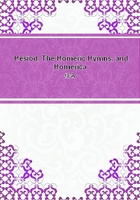
第87章 THE EPIGONI (fragments)
Fragment #1 --
Contest of Homer and Hesiod:
Next (Homer composed) the "Epigoni" in seven thousand verses, beginning, `And now, Muses, let us begin to sing of younger men.'
Fragment #2 --
Photius, Lexicon:
Teumesia. Those who have written on Theban affairs have given a full account of the Teumesian fox. (1) They relate that the creature was sent by the gods to punish the descendants of Cadmus, and that the Thebans therefore excluded those of the house of Cadmus from kingship. But (they say) a certain Cephalus, the son of Deion, an Athenian, who owned a hound which no beast ever escaped, had accidentally killed his wife Procris, and being purified of the homicide by the Cadmeans, hunted the fox with his hound, and when they had overtaken it both hound and fox were turned into stones near Teumessus. These writers have taken the story from the Epic Cycle.
Fragment #3 --
Scholiast on Apollonius Rhodius, Arg. i. 308:
The authors of the "Thebais" say that Manto the daughter of Teiresias was sent to Delphi by the Epigoni as a first fruit of their spoil, and that in accordance with an oracle of Apollo she went out and met Rhacius, the son of Lebes, a Mycenaean by race.
This man she married -- for the oracle also contained the command that she should marry whomsoever she might meet -- and coming to Colophon, was there much cast down and wept over the destruction of her country.
ENDNOTES:
(1) So called from Teumessus, a hill in Boeotia. For the derivation of Teumessus cp. Antimachus "Thebais" fr. 3(Kinkel).